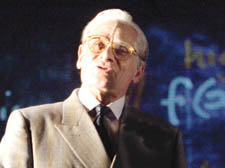|
|
 |
| |

Bruce Myers as George Soros |
Taking credit for crunch
THEN POWER OF US
National Theatre
WHO caused the credit crunch and why did it happen?
The Power of Yes by David Hare at the National Theatre provides a pastiche of contributions from a wide variety of participants, ranging from George Soros to Howard Davies, each telling part of the story, very much from his own perspective.
Against a dramatically staged background, Anthony Calf, playing David Hare himself, acts as the anchor man, interviewing people about their roles in what happened, putting himself in the position of most of the incredulous public outside the financial world, who only half understand how events unfolded and who was at fault.
Flitting between London and New York, we have bankers, lawyers, hedge fund managers, regulators, journalists and politicians, all inclined to explain why they were not to blame for the catastrophe which overtook the financial world. Was there, nevertheless, almost unbelievable greed, arrogance and misjudgment? Yes. Should anyone have believed that providing people with no jobs, no income and no assets with 125 per cent mortgages made sense? No. This looked OK as long as you believed that property prices would go on going up forever, but who in their right mind could believe this?
What comes across so clearly as the play progresses is that all those involved in the financial maelstrom were in their different ways caught up in the mania which accompanies all booms as they climb to their peak and then crash. As long as the boom lasts, you lose out if you bail out and it is this as much as anything else which drives the mounting frenzy.
The play concludes by getting close to denouncing markets in general and finance capitalism in particular as being beyond redemption.
It is surely true that very few people now believe that markets are always rational, that risks can always be controlled with clever enough formulae, and that boom and bust can be made a thing of the past – all notions which were prevalent as the financial crisis got closer. The reality, however, is surely rather different. Ever since banking and industrialisation got under way nearly 300 years ago, markets have been prone to rise and fall at reasonably long intervals. As a new generation comes along and memories fade, the lessons painfully learnt last time round are forgotten and the same mistakes and misjudgments happen again. It is not different this time. It is always more or less the same.
It is also true, as The Power of Yes very effectively brings out, that it is not the rich and powerful who suffer most from events like the recent crash. It is everybody else. Can we manage without the City? Probably not. Are many of the people who work there paid excessive sums for doing not particularly difficult jobs badly? Unfortunately, yes. Will it all happen again in another 10 or 20 years time? Probably.
In rep until October 26
0844 209 1805
• |

|
| |
| |
 |
|
|
 |
|



